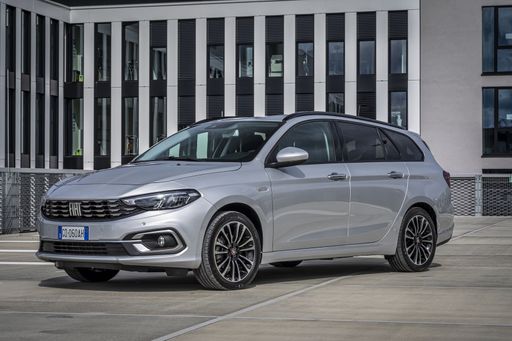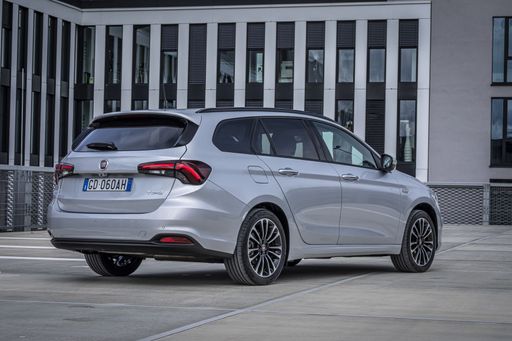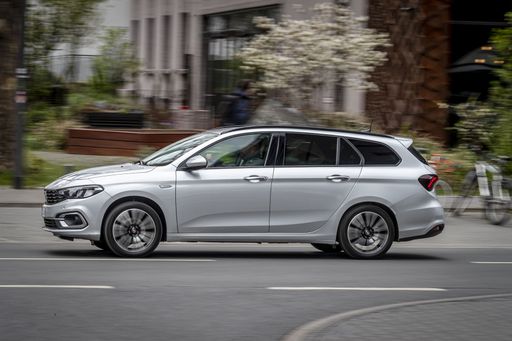Fiat Tipo Wagon vs Hyundai Kona – Differences & prices compared
Compare performance, boot space, consumption and price in one view.
Find out now: which car is the better choice for you – Fiat Tipo Wagon or Hyundai Kona?
The Fiat Tipo Wagon (Estate) comes with a Petrol MHEV or Diesel engine and Automatic or Manuel transmission. In comparison, the Hyundai Kona (SUV) features a Electric, Petrol or Full Hybrid engine with Automatic or Manuel transmission.
When it comes to boot capacity, the Fiat Tipo Wagon offers 550 L, while the Hyundai Kona provides 466 L – depending on how much space you need. If you’re looking for more power, decide whether the 130 HP of the Fiat Tipo Wagon or the 218 HP of the Hyundai Kona suits your needs better.
In terms of consumption, the values are 4.70 L per 100 km for the Fiat Tipo Wagon, and 14.60 kWh4.60 L for the Hyundai Kona.
Price-wise, the Fiat Tipo Wagon starts at 21000 £, while the Hyundai Kona is available from 23100 £. Compare all the details and find out which model fits your lifestyle best!
Fiat Tipo Wagon
The Fiat Tipo Station Wagon offers a spacious and practical solution for families seeking value without sacrificing comfort. Its sleek design and modern interior features create a pleasant driving experience, complemented by a range of user-friendly technology. On the road, the Tipo Estate provides a smooth drive, making it an ideal companion for both urban and longer journeys.
details @ media.stellantis.com
@ media.stellantis.com
 @ media.stellantis.com
@ media.stellantis.com
 @ media.stellantis.com
@ media.stellantis.com
Hyundai Kona
The Hyundai Kona blends a bold design with a versatile interior, making it a standout choice in the compact SUV market. Its crisp handling and responsive steering provide an engaging driving experience, whether in the city or on the open road. The vehicle also offers a range of features designed to enhance comfort and connectivity, ensuring a pleasurable journey for both driver and passengers.
details @ hyundai.news
@ hyundai.news
 @ hyundai.news
@ hyundai.news
 @ hyundai.news
@ hyundai.news
 @ hyundai.news
@ hyundai.news

|

|
|
|
|
Costs and Consumption |
|
|---|---|
|
Price
21000 - 27000 £
|
Price
23100 - 41600 £
|
|
Consumption L/100km
4.7 - 5.4 L
|
Consumption L/100km
4.6 - 7 L
|
|
Consumption kWh/100km
-
|
Consumption kWh/100km
14.6 - 16.8 kWh
|
|
Electric Range
-
|
Electric Range
377 - 514 km
|
|
Battery Capacity
-
|
Battery Capacity
1.3 - 65.4 kWh
|
|
co2
122 - 125 g/km
|
co2
0 - 163 g/km
|
|
Fuel tank capacity
50 L
|
Fuel tank capacity
38 - 47 L
|
Dimensions and Body |
|
|---|---|
|
Body Type
Estate
|
Body Type
SUV
|
|
Seats
5
|
Seats
5
|
|
Doors
5
|
Doors
5
|
|
Curb weight
1455 - 1470 kg
|
Curb weight
1370 - 1773 kg
|
|
Trunk capacity
550 L
|
Trunk capacity
466 L
|
|
Length
4571 mm
|
Length
4350 - 4385 mm
|
|
Width
1792 mm
|
Width
1825 mm
|
|
Height
1514 mm
|
Height
1580 - 1585 mm
|
|
Payload
475 kg
|
Payload
420 - 490 kg
|
Engine and Performance |
|
|---|---|
|
Engine Type
Petrol MHEV, Diesel
|
Engine Type
Electric, Petrol, Full Hybrid
|
|
Transmission
Automatic, Manuel
|
Transmission
Automatic, Manuel
|
|
Transmission Detail
Dual-Clutch Automatic, Manual Gearbox
|
Transmission Detail
Manual Gearbox, Dual-Clutch Automatic
|
|
Drive Type
Front-Wheel Drive
|
Drive Type
Front-Wheel Drive, All-Wheel Drive
|
|
Power HP
130 HP
|
Power HP
115 - 218 HP
|
|
Acceleration 0-100km/h
9.1 - 10.1 s
|
Acceleration 0-100km/h
7.8 - 11.9 s
|
|
Max Speed
206 - 207 km/h
|
Max Speed
162 - 210 km/h
|
|
Torque
240 - 320 Nm
|
Torque
200 - 265 Nm
|
|
Number of Cylinders
4
|
Number of Cylinders
3 - 4
|
|
Power kW
96 kW
|
Power kW
85 - 160 kW
|
|
Engine capacity
1469 - 1598 cm3
|
Engine capacity
998 - 1598 cm3
|
General |
|
|---|---|
|
Model Year
2024
|
Model Year
2024 - 2025
|
|
CO2 Efficiency Class
D
|
CO2 Efficiency Class
A, D, C, E, F
|
|
Brand
Fiat
|
Brand
Hyundai
|
Fiat Tipo Wagon
Introduction to the Fiat Tipo Station Wagon
The Fiat Tipo Station Wagon has long been a staple in the automotive world, celebrated for its practical design, spacious interior, and affordability. The 2024 model continues this tradition, offering impressive updates in technology and performance, making it a significant contender in the compact estate car market. Here, we take a closer look at what makes the Fiat Tipo Kombi a standout choice.
Engine and Performance
Under the bonnet, the Fiat Tipo Station Wagon showcases its versatility with a choice of powertrains. Its offerings include a 1.5 GSE Hybrid with a mild-hybrid system that enhances fuel efficiency and provides a responsive driving experience. This engine choice delivers 130 PS and achieves a commendable fuel consumption rate of 5.4 L/100km.
For diesel enthusiasts, the 1.6 MultiJet engine provides a robust performance with the same 130 PS but boasts an even lower fuel consumption of 4.7 L/100km. Both engine variants offer a front-wheel drive system which is complemented by either a dual-clutch automatic transmission or a traditional manual gearbox, ensuring a pleasurable driving experience tailored to individual preferences.
Advanced Technology and Innovations
The 2024 Fiat Tipo Station Wagon is equipped with a suite of modern technologies, enhancing both safety and convenience. The model features an advanced infotainment system that integrates seamlessly with smartphones, offering navigation, media, and communication tools via a sleek and intuitive touchscreen interface.
On the safety front, the Tipo Station Wagon is equipped with various driver assistance systems, including adaptive cruise control and lane-keeping assist, ensuring both comfort and security on the road. These innovations reflect Fiat's commitment to merging safety with cutting-edge technology.
Design and Comfort
From a design perspective, the Fiat Tipo Station Wagon maintains a sleek and modern aesthetic, characterised by clean lines and a distinctive front grille that conveys confidence. The vehicle's dimensions (4571 mm in length, 1792 mm in width, and 1514 mm in height) provide ample space for passengers and gear, while a generous boot offers 550 litres of cargo capacity.
Inside, the Tipo Station Wagon is designed with comfort in mind, accommodating five passengers comfortably. The interior cabin is spacious, with quality materials and ergonomic seating ensuring that long journeys are undertaken in comfort.
Efficiency and Environmental Considerations
Efficiency is at the core of the Fiat Tipo Station Wagons design, as evidenced by its low fuel consumption figures and CO2 emissions ranging between 122 and 125 g/km, securing a CO2 efficiency class of D. This makes the vehicle an environmentally conscious choice without sacrificing performance or convenience.
Conclusion
For those in search of a reliable, spacious, and technologically advanced vehicle, the Fiat Tipo Station Wagon stands out as an excellent option. Its combination of performance, efficiency, and modern technology, all wrapped in a stylish design, ensures that it remains a top choice for 2024 and beyond.
Hyundai Kona
The Hyundai Kona: A Comprehensive Overview
The Hyundai Kona has established itself as a standout in the compact SUV segment, blending innovation with performance and style. As the automotive world moves towards more sustainable and efficient options, the Kona offers a variety of powertrains, from traditional petrol engines to full hybrids and all-electric models.
Powertrain Options and Performance
The Hyundai Kona's powertrain choices cater to a wide range of preferences. For petrol enthusiasts, the Kona offers a 1.0L T-GDI engine, delivering 100 PS, and a more robust 1.6L T-GDI variant with up to 170 PS. Those looking for efficiency without sacrificing power can consider the full hybrid model, offering 129 PS and an impressive consumption of 4.5 L/100km.
For a greener option, the all-electric Kona provides a compelling case. With battery capacities of up to 65.4 kWh, the electric Kona offers power outputs of 156 to 218 PS, and efficiencies as low as 14.6 kWh/100km, enabling an electric range of up to 513 km.
Technical Specifications and Innovations
Built on a robust platform, the Kona delivers versatility and reliability. With a choice between manual or dual-clutch automatic gearboxes, along with options for front-wheel or all-wheel drive, the Kona ensures a tailored driving experience. The handling is enhanced by the car's lightweight construction, balancing a 1370 to 1773 kg curb weight with dynamic performance.
The Kona's design doesn't compromise cargo space for style; it offers a generous 466 L boot capacity. With a relatively compact body, measuring 4350 to 4385 mm in length, the Kona easily navigates urban environments while still commanding a strong road presence with its 1825 mm width.
Efficiency and Eco-Friendliness
Hyundai is committed to reducing emissions, as evidenced by the Kona's CO2 efficiency ratings, which range from class A for electric models to class D for some higher-performance petrol variants. The focus on reducing environmental impact without sacrificing driving pleasure is notable throughout the Kona range.
Costing and Value
The Hyundai Kona offers commendable value for money. Pricing starts at €26,400 and reaches up to €50,690, depending on the chosen configuration. The monthly running costs range from €956 to €1090, with a cost per kilometre of 38.3 to 43.6 cents, making it a competitive option in its class.
Conclusion: Modern, Efficient, and Versatile
The Hyundai Kona stands as a testament to Hyundai's commitment to innovation, efficiency, and practicality. Whether you are inclined towards a traditional combustion engine, a hybrid for a balance of power and efficiency, or a full electric model for maximum eco-friendliness, the Kona provides a tailored solution for each unique driver preference.
Which drive types are available for the Fiat Tipo Wagon?
Available as Front-Wheel Drive.
The prices and data displayed are estimates based on German list prices and may vary by country. This information is not legally binding.
